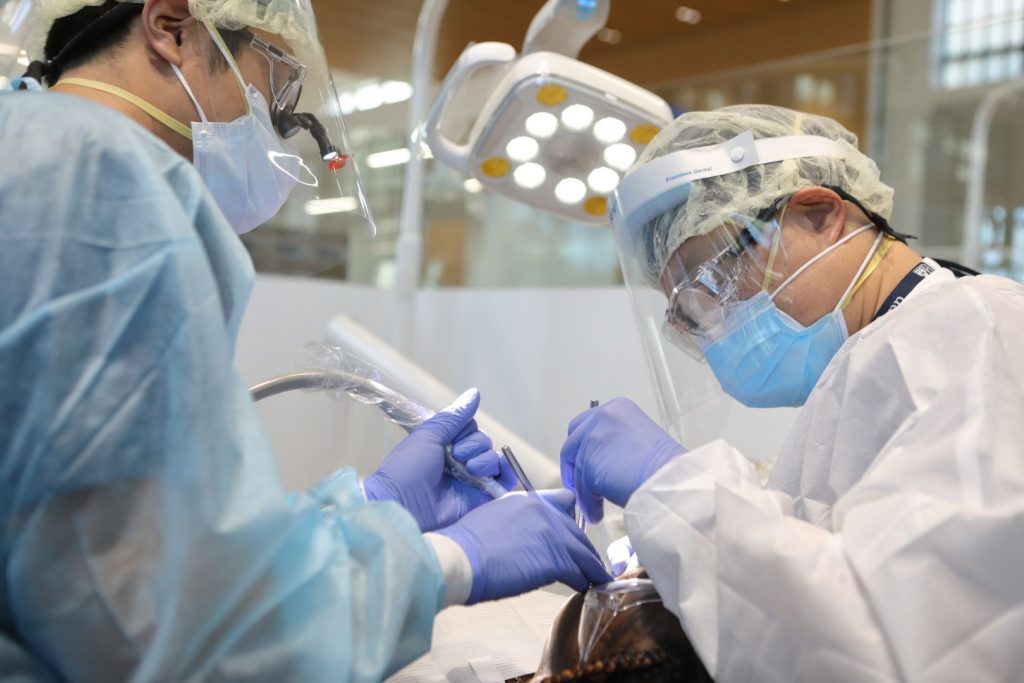Penn Dental Medicine is hosting a new patient Admissions Fair for Veterans on November 14th
Periodontal disease, more commonly known as gum disease, is a serious oral health condition that affects millions of people worldwide. Over 47% of adults aged 30 years and older experience some form of gum disease. Fortunately, people suffering from gum disease in Philadelphia and the surrounding areas have access to highly skilled periodontist specialists at Penn Dental Medicine (PDM), who treat this disease with exceptional care using the latest techniques.
Gum Disease and Why You Need a Periodontal Specialist To Treat It
You may be surprised to learn that the cause of periodontal disease is simple: It develops because of poor brushing and flossing. That’s why so many people suffer from it.
These bad oral hygiene habits cause plaque, a sticky film made when the sugars in food meet bacteria in your mouth, to build up on teeth and harden under the gum line, turning into tartar. Tartar keeps bacteria in constant contact with your teeth, and the resulting infection is what causes gum disease. If left untreated, it can lead to tooth loss and other serious oral health problems.
Warning Signs of Gum Disease

Symptoms include:
- Red, swollen, or tender gums: Healthy gums should be pink and firm. If your gums are red, swollen, or tender to the touch, it may be a sign of gum disease.
- Bleeding gums: If your gums bleed when you brush or floss your teeth, it could be a sign of gum disease. Healthy gums should not bleed during regular oral hygiene practices.
- Bad breath: Persistent bad breath, despite practicing good oral hygiene, can be a sign of gum disease. The bacteria that cause gum disease produce odorous compounds that result in bad breath.
- Receding gums: If your gums are pulling away from your teeth, exposing more of the tooth roots, it may be a sign of gum disease. Receding gums can also make your teeth appear longer than usual.
- Loose or shifting teeth: Gum disease can lead to the loss of bone and tissue support for the teeth, causing them to become loose or shift in position. If you notice any changes in the alignment or stability of your teeth, it may be a sign of gum disease.
- Pus between gums and teeth: The presence of pus in the gum pockets, which are spaces between the gums and teeth, is a clear indication of an infection and advanced gum disease. This pus results from the body’s immune response to the bacteria that cause gum disease.
If you’re experiencing any of these symptoms, schedule an appointment to see one of the periodontist specialists at PDM in one of our Philadelphia area locations. They can evaluate and diagnose the situation and any underlying issues, then provide appropriate treatment to prevent further damage.
The Difference Between Periodontal Specialists and Dentists
 While general dentists can treat mild cases of gum disease, gum disease specialists have advanced training and expertise in diagnosing and treating more severe cases. They can provide specialized treatments such as scaling and root planing, gum grafts, dental implants, and laser therapy.
While general dentists can treat mild cases of gum disease, gum disease specialists have advanced training and expertise in diagnosing and treating more severe cases. They can provide specialized treatments such as scaling and root planing, gum grafts, dental implants, and laser therapy.
Periodontal specialists also have a deeper understanding of the underlying causes and risk factors associated with gum disease. They can develop personalized treatment plans and provide education on proper oral hygiene practices to help prevent the recurrence of gum disease.
Furthermore, as periodontal disease doctors, they stay up-to-date with the latest advancements in periodontal treatments and technologies. They are skilled in using advanced techniques and tools that can effectively treat gum disease and improve oral health outcomes.
Here at PDM, this is especially true because we have been educating the next generation of dentists within our program with the University of Pennsylvania School of Dental Medicine since 1878. We are on top of every advancement in the treatment of gum disease.
Gum Disease Doesn’t Go Away on Its Own. It Takes a Periodontist Specialist
Once plaque hardens and turns into tartar, it can’t be removed by brushing and flossing. It needs to be removed by a periodontal specialist.
Depending on the progression of your gum disease, the periodontist may treat the disease with:
- Scaling and root planing: A deep-cleaning treatment that removes plaque and tartar.
- Medication: Antibiotics or antimicrobial mouth rinses to help control infection and reduce inflammation.
- Dental implant placement: Surgically placing artificial tooth roots into the jawbone to replace missing teeth.
- Periodontal pocket reduction surgery: Reducing the depth of pockets that form between the teeth and gums due to gum disease, making it easier to clean and maintain oral hygiene.
- Gum surgery: Removing the infected gum, using gum grafts to help restore damaged or lost gum tissue, or reshaping the gums to improve their appearance and create a more balanced smile.
Looking for Periodontal Specialists in PA? Call PDM
 When choosing a periodontist specialist, look for one who has completed advanced training in periodontics and is board-certified. They should have a comprehensive understanding of gum disease and its treatment options, as well as extensive experience in performing periodontal procedures. That’s who you’ll find at Penn Dental Medicine.
When choosing a periodontist specialist, look for one who has completed advanced training in periodontics and is board-certified. They should have a comprehensive understanding of gum disease and its treatment options, as well as extensive experience in performing periodontal procedures. That’s who you’ll find at Penn Dental Medicine.
If you think you or a loved one is suffering from gum disease or have concerns about your gum health, visit a PDM periodontist. Additionally, whether you live in Center City, South Philadelphia, or the suburbs, you don’t need to travel far to visit us. Make an appointment here or call 215-898-8965. We’ll see you soon at our 240 S. 40th Street location.
Get Your Appointment Now
We look forward to serving you and your family.




